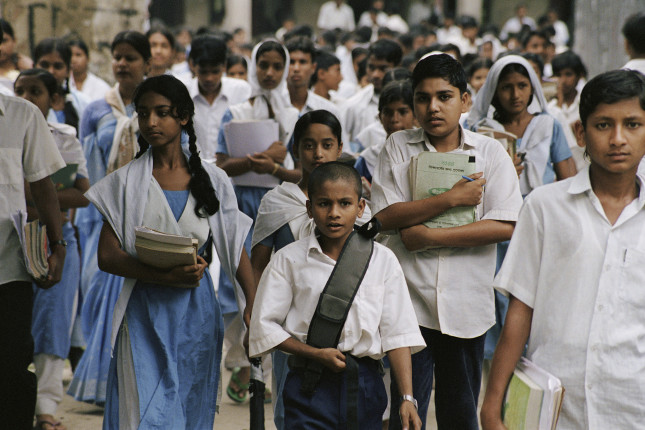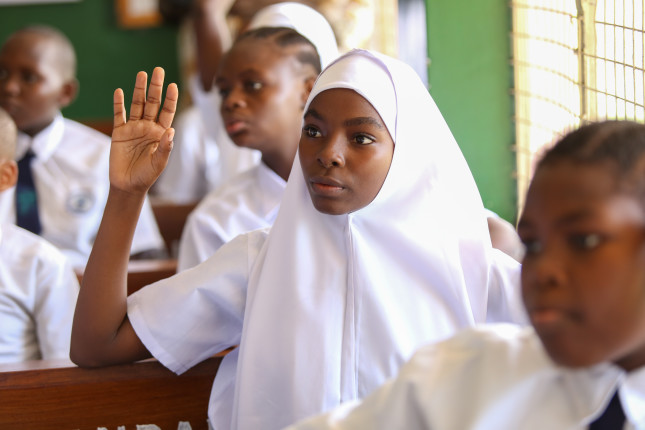-
Bangladesh and Pakistan: Demographic Twins Grow Apart
›
While the World Population Prospects—the UN Population Division’s demographic estimates and projections—will never land on anyone’s non-fiction best-seller list, the latest version holds some noteworthy true stories. And the most remarkable demographic story of all may be Bangladesh’s.
-
Everybody Counts: Saving the World One Condom at a Time
› Can we save the world one condom (or birth control pill) at a time? The third episode of Everybody Counts, hosted by Jennifer D. Sciubba, a professor of political demography at Rhodes College, makes the case that family planning is the foundation of peace and security by highlighting the links between population growth and political instability.
Can we save the world one condom (or birth control pill) at a time? The third episode of Everybody Counts, hosted by Jennifer D. Sciubba, a professor of political demography at Rhodes College, makes the case that family planning is the foundation of peace and security by highlighting the links between population growth and political instability. -
Ageing Populations Could Create a Care Crisis—Or Millions of Jobs
›
The silver tsunami is approaching: Many countries, not all of them rich, are facing the challenges of an ageing population thanks to growing life expectancies and shrinking birth rates.
-
Separatist Conflicts Persist, While Revolutions Just “Age Away”
›
The research presented in this article was subsequently published in a peer-reviewed article: https://link.springer.com/chapter/10.1007/978-3-030-73065-9_3
The Kurdish people’s century-long quest for self-determination reveals a key aspect of ethnic separatist conflicts. Ideas of nationhood can endure for generations, unifying people across borders and often making separatist conflicts hard to resolve. But how much harder is it to resolve separatist conflicts than other violent, non-territorial intra-state wars (such as political revolutions)? In practical terms, how much longer, on average, can policymakers expect separatist conflicts to persist and reoccur than the typical political revolution? These are tough questions. Surprisingly, demography helps us find the answers.
-
Parfait Eloundou-Enyegue: Moving from Laundry Lists to Bottom Lines
› “A lot of the advocacy of family planning has been built around establishing a long list of the many ways in which family planning can be relevant” to other development goals, says Parfait Eloundou-Enyegue of Cornell University in our latest Friday Podcast. While comprehensive accounts of the ways family planning access benefits communities, these “laundry lists” are not “clear, synthetic, or integrative,” he says.
“A lot of the advocacy of family planning has been built around establishing a long list of the many ways in which family planning can be relevant” to other development goals, says Parfait Eloundou-Enyegue of Cornell University in our latest Friday Podcast. While comprehensive accounts of the ways family planning access benefits communities, these “laundry lists” are not “clear, synthetic, or integrative,” he says. -
Forever Young: Engaging Youth to Build Stability and Reduce Violence
›
“There are more young people in the world today than in any other time in the history of the world,” said Beza Tesfaye, Senior Researcher at Mercy Corps, at a recent event at the U.S. Institute of Peace on Mercy Corps’ efforts to engage youth in Somalia and Afghanistan in order to promote stability and prevent violence. “As we know, marginalized youths are the ones often to be recruited into violent movements. Not only do we have to focus on conflict, but we also have to put youth at the center of development programs to address these issues.”
-
A More Prosperous World: Investing in Family Planning for Sustainable Economic Growth
›
“There is a close relationship between fertility rates and health on one hand, and economic growth on the other,” said Peter McPherson, President of the Association of Public Land-Grant Universities and former USAID Administrator, at the final event in a three-part series on the role of population and family planning in supporting economic growth, health, and education.
-
Nicaragua and the Fading of Latin America’s Youthful Clusters
›
After four months of political unrest and more than 250 deaths, the calls for Nicaragua’s embattled president Daniel Ortega to step down are escalating. One of political demography’s most robust statistical findings tells us that countries where an authoritarian government rules a youthful population, any change in regime typically yields an autocracy or at best, a partial democracy. Only very rarely has a liberal democracy emerged immediately after a rebellion in a youthful country (one with a population with a median age under 26 years). Given this, if Ortega is ousted from office, what type of leader should foreign affairs analysts expect to replace him?
Showing posts from category demography.


 Can we save the world one condom (or birth control pill) at a time? The third episode of
Can we save the world one condom (or birth control pill) at a time? The third episode of 

 “A lot of the advocacy of family planning has been built around establishing a long list of the many ways in which family planning can be relevant” to other development goals, says Parfait Eloundou-Enyegue of Cornell University in our latest Friday Podcast. While comprehensive accounts of the ways family planning access benefits communities, these “laundry lists” are not “clear, synthetic, or integrative,” he says.
“A lot of the advocacy of family planning has been built around establishing a long list of the many ways in which family planning can be relevant” to other development goals, says Parfait Eloundou-Enyegue of Cornell University in our latest Friday Podcast. While comprehensive accounts of the ways family planning access benefits communities, these “laundry lists” are not “clear, synthetic, or integrative,” he says.




